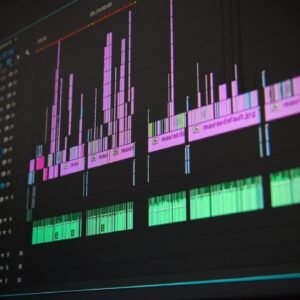Hi! If you are studying for exams, and want more motivation, here’s a useful tip! We all know that study music helps you studying. But there is also electronic study music. This kind of music is quite different from normal study music. It reduces stress and makes you feel relaxed. Having a relaxed mind will help you remembering the material and understanding it much better. Electronic study music relaxes your brain while you listen to the music. It can help you concentrating on the things that need to be remembered by your brain even in silence. The memories will be long lasting so that you will have no problem passing tests, keeping your grades high, or helping you remembering details until the next time you come across them.
In this article, I will talk about “Electronic Study Music”. Let’s start.
Using Music For Concentration
Studying With Music Is Way Better
You know the drill: you’re trying to study, but can’t focus on anything. Or maybe that’s just me…
The solution? Music. But not just any music. Studies have shown that certain types of music can actually help you study better and retain more information.
In this article, we’ll look at the science behind studying with music (and what type of music you should listen to). Then we’ll discuss how you can use this information to improve your own studying sessions.
If you’re the type of person who likes to listen to music while you work, then you know that it can help you focus and get things done. But did you know that it can also make studying easier?
Music is a powerful tool that can be used to improve your ability to concentrate and engage with your learning material. Studies have shown that listening to music while studying can help students recall information better, retain information longer and improve their overall academic performance.
How Music Helps With Studying
There are many reasons why listening to music while studying can be beneficial, but let’s take a look at some of the main ones:
It reduces anxiety by allowing you to concentrate on something other than what you’re reading or working on.
It helps boost your mood and relieve stress so that it doesn’t interfere with concentration or memory retention.
It gives your brain a break from focusing on words or numbers for long periods of time which can allow for a more thorough understanding when returning back to your work.

FAQs for Electronic Study Music
Now that you understand “Electronic Study Music”, let’s move on to the FAQ section.
Is Electronic Music Good For Studying?
Electronic music is a broad term that refers to any kind of music that is created using electronic instruments, computers and/or digital technology.
It’s a genre that has been around since the 1960s, but it only gained prominence in the 1980s when artists began blending it with other styles like hip hop and dance music. Today, electronic music is one of the most popular genres in the world with thousands of artists making it every day. It’s easy to see why: Electronic music allows its creators to be creative and innovative by incorporating new sounds and styles into their work.
If you love studying to music (and who doesn’t?), then you might want to consider adding some electronic beats into your routine. Here are some reasons why:
Electronic Music Can Help You Focus
Electronic music tends to be very rhythmic, which means that it has a strong beat or rhythm that keeps your mind focused on what you’re doing at all times. This can help tremendously when you need to concentrate on something important like studying or working on an assignment for class.
What Is The Example Of Electronic Music?
Electronic music is a genre of music that involves the use of electronic musical instruments and technology, such as synthesizers, sequencers, drum machines, and other electronic devices and computers. In general, a distinction can be made between sound produced using electromechanical means (electromagnetic emission or amplification of an electrical signal), and that produced using electronic technology. Examples of electromechanical sound production include the telharmonium (or electric piano), first patented in 1897; the Hammond organ, patented in 1934; and the electric guitar.
Electronic instruments are often used in modern popular music genres such as electronic dance music (EDM) and hip hop music. Electronic music also includes genres that feature synthesizers or electronic productions and even more broadly includes all types of electronically produced music such as techno, house, trance, IDM, deep house etc.
Electronic music is a broad range of styles of experimental and popular music which employs electronic musical instruments, digital instruments and circuitry-based music technology. In general a distinction can be made between sound produced using electromechanical means and that produced using electronics only. Examples of electromechanical sound producing devices include the telharmonium, Hammond organ, and the electric guitar. Electronic instruments include synthesizers, digital samplers and drum machines.
In general, an electronic instrument is any musical instrument that produces sounds using electronics. Some common examples include the electric guitar (which uses pickups to convert the vibration of its strings into electrical signals), digital pianos (which generate sound by sending an electronic signal through a synthesizer) and electronic drum kits (which use triggers to cause a sample to play).
Electronic music includes many genres including electroacoustic music, computer music and pure synthesized forms such as “chiptunes”. One type of electroacoustic device is a sampler which takes small bits of recorded music as its source material and plays them back in a different order or at different speeds; this is sometimes called “musique concrète”.
What Is The Best Background Music For Studying?
Playing music while studying can help you to focus, as it has been proven to reduce distractions. The right kind of music can make you more productive and boost your memory.
Studies show that the best background music for studying is classical music, which boosts concentration, enhances comprehension and improves reading speed.
The next best type of music for studying is instrumental music with no lyrics. Ambient sounds such as rain or waterfalls work well too. It’s best to find a track without lyrics as they can be distracting when you are trying to concentrate on something else.
You need to find the right music for your study sessions. The right music can help you stay focused and productive, while the wrong one can make you lose your focus and motivation.
Here are five types of background music that are great for studying:
Chillstep – This is a popular subgenre of electronic music that’s characterized by slow beats, ambient sounds and melodic vocals. This type of music works best when you’re looking to study at home or in a quiet place where there won’t be any distractions. It’s perfect if you’re trying to focus on reading or writing essays.
Classical Music – Classical music has been proven to be beneficial for concentration and attention span. It increases intelligence by sharpening your mind and improving memory retention skills. However, classical music isn’t always ideal for studying because it may cause drowsiness in some people due to its slow tempo and relaxing atmosphere. If this happens to you, switch over to jazz instead!
Jazz – Jazz is upbeat yet relaxing at the same time so it helps increase concentration levels while keeping your mind from wandering off track too much during study sessions! Jazz also helps improve memory retention skills as well as mental agility which comes in handy when taking exams!
Is Edm Good For Your Brain?
Is EDM Good for Your Brain?
EDM is a form of dance music that emerged in the early 1990s. It was created by mixing electronic sounds with disco, techno and house music. EDM has been popularized by artists like Tiesto, Calvin Harris and David Guetta.
There are several theories about why EDM has become so popular. One theory is that young people like it because it’s loud and exciting. Another theory is that young people enjoy EDM because it provides them with an escape from their ordinary lives.
A recent study suggests another reason why people like EDM: The music seems to improve cognitive function in people who listen to it while doing mental tasks (1).
If you’re a fan of electronic music, you might be wondering if it’s good for your brain. After all, the genre is known for its upbeat nature, and many EDM songs are designed to make people feel good. But there’s more to electronic music than just party vibes — some people use EDM as a way to enhance their mental performance.
What Is Electronic Dance Music?
EDM is a blanket term used to describe several different types of electronic music. It’s often characterized by fast tempos and a heavy emphasis on melody rather than lyrics or instrumentation. The genre has roots in disco, house, techno and hip-hop music but has evolved into something entirely new over the years.
Many people think of EDM as being synonymous with rave culture, which is why they assume it’s only popular among young people who like to dance at festivals or clubs late at night. But the truth is that EDM can be enjoyed by anyone who likes electronic music and wants to relax with it at home or work during their free time.
Why Is Edm So Relaxing?
EDM, or electronic dance music, has become one of the most popular genres of music in the world. The songs are full of catchy beats and rhythms that can be enjoyed on their own, but also have a deeper meaning when you listen to them closely.
Why is EDM so relaxing? There are many reasons why EDM is so relaxing and therapeutic. First, the beat and rhythm of EDM songs are slower than other genres like pop or rock. This means that they don’t have as much energy and excitement which can be draining when listening to them over time.
Second, EDM songs usually have slower tempos than other genres as well. While this may not seem like a big deal at first glance, it adds up over time and can help you relax more quickly than other types of music with faster tempos such as rock or pop.
Third, EDM music often has slower bpm (beats per minute) than other genres do which is another way that it helps people relax more quickly than other types of music would allow for.
Conclusion for Electronic Study Music
There are many benefits to using this type of music. There have been a few articles written about why studying with music is beneficial however I think that article is only focused on the music itself and doesn’t cover the other aspects of studying. I hope this article helps you find a way to incorporate electronic study music into your daily routine.
Thank you for reading, and I hope you get the point of “Electronic Study Music”. If not, please contact me or leave a comment below. I would be pleased to help in any way I can.




